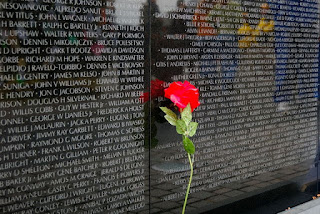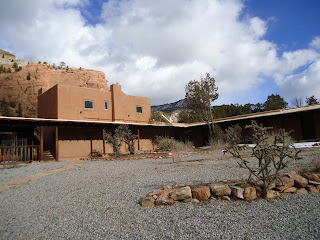At our Thanksgiving dinner, Donna asked me to say grace and continue our yearly Thanksgiving tradition of going around the table and mentioning what we are thankful in that current year. I've been married for 32 years and don't ever remember doing that before - no, not grace, the going around the table part. It seems like a nice thing to do though so we did, and as I recall I was thankful for family and the food on the table. I was brief, the turkey was getting cold.
I'm sure we did that blessing every year, but I just don't remember. I used to work with a bookkeeper, Jenny, who gave her son the same Christmas card every year, put it away and gave it to him the following year. She used the same card for 21 years, then got a new one. I guess the son and I share certain traits.
But I've been thinking about gratitude, since I gave it such short shift that day. Here's some thoughts:
I'm grateful for my son Adam, his wife Alexia, and of course, pictured above, their son Gavin, now 15 days old.
I'm grateful for a loving wife who has put up with me and my grumpiness for years. I'm sure she will be rewarded in heaven.
I'm grateful that...."I still haven't figured it all out yet." Just when I'm ready to turn off the light switch and leave the room of people's charity and love, life shows me things. We all saw the recent internet photo of the NY police officer who gave the person in need some new boots and socks. As a police officer, he must see more misery in a month than I see in a life-time, but it didn't seem to make him callus - charity and love must fire his heart or he wouldn't have responded the way he did. I'm grateful to God for that realization and for him..
We all hitch hike through the combination of life's speed bumps and open roads. I concentrate on the bumps too much, and I'm grateful that in the past two weeks, three people I can think of, have committed acts of kindness. It's not about me, they don't know me personally, so I know that the kindness they displayed must be an important part of who they are. Last week, I lost my wallet in a DC hotel (Crown Plaza, Tyson's Corner.) The bartender in the restaurant went out of his way to recover it, even after I had searched myself without success. He saw the wallet and returned it to me. He could have kept it.. I'm grateful for him. Then several days ago, Amy, an event host of the group, Raleigh Write to Publish, went the extra mile and made sure me and others were allowed into an important (to us) overbooked event this coming January. She didn't have to do that either. And last, and not least, I asked a free lance editor, Victoria Shockley (victoriashockleywrites.wordpress.com) to do a developmental edit of my book manuscript. I told her it didn't need copy editing, but after reading, "the aurora of bliss," and "She weighted at least one hundred and ten pounds," she went ahead with a complete word-for-word assessment - again, over and above what I asked or expected. Kudos and appreciation to all.
.
I'm grateful for strong black coffee in the morning.
I'm grateful for the chance to get into the day; those first few seconds in the morning when you open the door to witness God's first draft of the day; whether it be raining, clear, sunrise, or snow.
I'm grateful for good pizza.
I'm grateful for the absurdity in life. We have a President who's a smoker, thinking he can reform the entire healthcare system and a US Secretary of the Treasury who advocates higher taxation, but fails to pay his own income tax. I'm also grateful I can see the absurdity in my life. When I turned 65, I though I would morph into Henry Fonda with a cardigan sweater and a pipe. Instead I spent part of that afternoon dragging a small magnet at the end of a piece of twine around a pear tree in our front yard. A small machine screw had fallen off the bracket holding the noise suppressor of the chain saw I was using on the tree's branches. I knew the screw would be hard to replace and expensive - ergo, the magnet. Just then a car drove by the house and I could only imagine what the driver was thinking: I started to laugh. I'm grateful for that.
I'm grateful for our dog, Bruno. He was with me in the above incident and he's quite comfortable with the fact he possesses no sense of observed humiliation. No matter what, anything I do or say is ok with him. I'm comfortable with that too...and grateful.
I'm grateful that in an age when many seek their own accommodation which can lead to sometime selfishness, my son is part of the US Coast Guard. When others see calamity and try to work around it, or away from it, the Coast Guard moves toward it. They may not always be called upon to be heroes, but their job is heroic.
I'm grateful I can bench press my resting pulse (so far).
I'm grateful for the gift of travel and especially the Alaskan cruise we took in September. We were pampered beyond belief. When we decided re-filling a water glass during a meal would require too much aerobic exercise, there were always waiters to do that for us. They fluffed the pillows and made the bed, turned down the bed and fluffed the pillows again - we cruisers all became quite accustomed to the service. I'm surprised they didn't carry us around the ship on a cushioned litter, one steward on each corner, so we could be presented to the main dining room like Cleopatra. Next time we'll ask. But I'm really greatful for guy we shared a cab with after docking and heading back to the Seattle Airport. He carried a fishing rod with him and explained one of his uncles (wasn't sure which one) paid for his passage for a family reunion. He didn't care much for the trip. When the boat docked in Ketchican, he moved down the dock about 300 feet and threw his line in over the edge of the pier - wanting to catch his supper. He was assailed by a flying squad of Ketchican police, Alaskan fish and game wardens, and some ship's crew; all pointing out numerous legal violations. Let me tell you he sounded bummed. He was forced to eat cruise food.
He kept repeating to us in a pleasant, but fanciful way, " Back home, I'm off the grid. They don't know I exist because I don't believe in banks or credit cards. I'll only pay cash if I really need something and can't barter for it." Seems he is an illegal gold hunter in the California Sierras. He used to be able to get short-term permits to explore for gold, but the government stopped issuance when the Mexican cartels sent marijuana growers to the mountains of Northern California. From personal experience, he told us the growers would fire weapons at anyone approaching their plants, but that didn't seem to stop him. Gunfire, no problem: no permits, no problem. He spent his days avoiding government wildlife wardens, the DEA, and drug growers; all in his pursuit of the yellow. After telling the cab driver he really liked his ride, he mentioned he had a similar SUV, but with the windows shot out (I didn't ask.) He then got on his cellphone and called his sister, who was cabin-sitting his place, and inquired as to whether any of the wild bears had eaten his dogs (I didn't ask). He was one of the most pleasant and manic freebooters Donna and I have ever met in our travels, and without knowing exactly why, I think the country is better for having him in it.
I await his reality show.


















